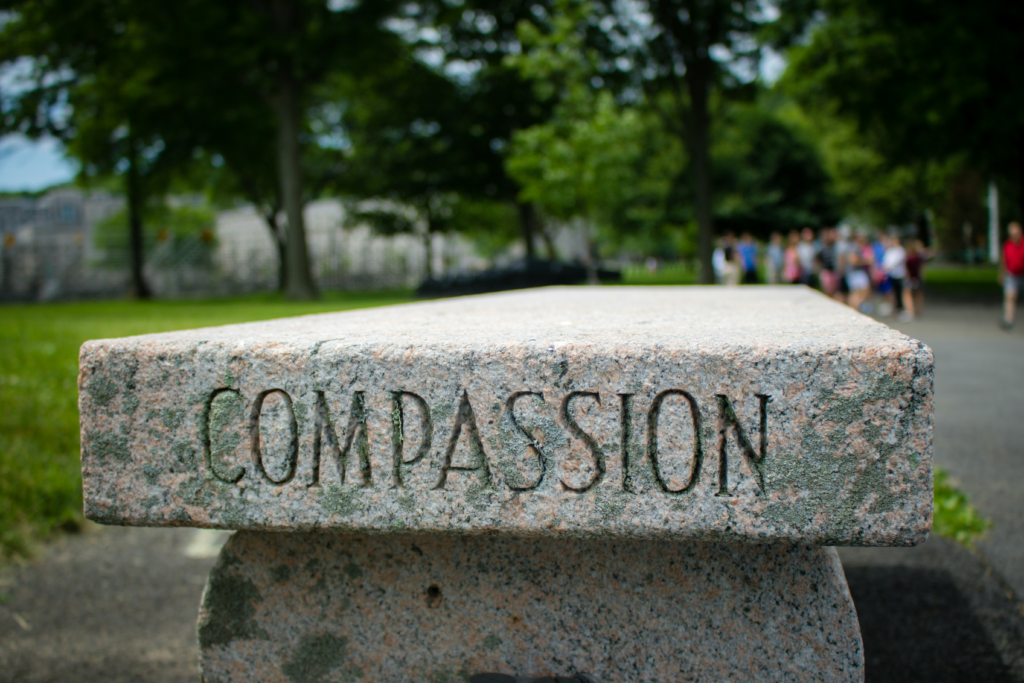
His Holiness, Swami Advaitananda Giri, Toronto, The Growth Indicators of Meditators – #4 – Become More Compassionate
Today, let’s dive into an essential quality that grows through meditation—compassion. True compassion is not just sympathy or pity. It’s deeper, purer, and more transformative. As Buddha beautifully explained, compassion is love plus meditation. It’s love that has matured, expanded, and transcended into something divine.
When your love is no longer about desires or needs, but about sharing from a place of fullness—when your love is not about asking, but about giving with joy—then, with meditation, this love transforms into compassion. Compassion is the highest expression of our humanity, touching the divine within us.
But how do we know if meditation is making us more compassionate? Here are self-inquiry questions to guide your reflection:
Ask yourself:
- Do I feel an inner urge to help and uplift others, even without expecting anything in return?
- Am I able to recognize and genuinely feel the pain and struggles of others without judgment or comparison?
- Is my response to others’ suffering becoming more proactive, gentle, and patient?
Pause for a moment to reflect on your interactions with the world.
- When I see someone struggling, do I instinctively feel a desire to support them, or do I look away?
- Am I growing in my ability to forgive, letting go of resentment and seeing others with understanding and empathy?
- Is my kindness extending beyond my loved ones to strangers, or even those I find difficult to deal with?
Look deeper into the quality of your compassion.
- Can I give without a sense of superiority or ego, simply for the joy of giving?
- Am I finding fulfillment in small, selfless acts of kindness, knowing they bring light to someone else’s life?
- When I help, do I feel a sense of peace and connectedness, rather than expecting acknowledgment or gratitude?
And now, reflect on whether your compassion is becoming universal.
- Is my care extending beyond people to animals, nature, and the world itself?
- Do I feel a sense of oneness, where someone else’s joy or suffering feels as if it were my own?
- Is my compassion flowing naturally, without calculation, as if it were a part of my being?
Finally, consider the spiritual dimension of compassion.
- Has my meditation deepened my understanding that true compassion arises from love free of attachments, born of silence and inner peace?
- Do I sense that compassion is not something I do, but something I am—a natural extension of my meditation practice?
When love transforms into compassion, it becomes divine. It’s no longer limited to individuals or specific situations. It becomes a quality that radiates from your very being. Compassion is not just an action; it’s a state of existence.
So, as you continue your meditation journey, reflect on these questions. Let your meditation guide you toward compassion—a compassion that is universal, unconditional, and eternal. Because when you embody compassion, you bring healing and light not only to others but also to yourself.
Thank you for joining me in this reflection. May your meditation deepen, and may your compassion touch the lives of everyone you meet.
———————————————————————————————————————————————
Compassion, as defined by Buddha, is the union of love and meditation. It goes beyond mere desire or need and encompasses a deep sense of sharing and giving without expecting anything in return. When love is not just a longing, but a selfless act of generosity, and when meditation is added to this equation, a pure and exquisite fragrance is released—the essence of compassion.
In our human experience, there are different levels of connection. Sexuality, which is rooted in our animal nature, is one level. It is a physical expression of desire and pleasure. Love, on the other hand, transcends the physical and reaches into the realm of psychology. It is a deep emotional bond that we form with others. But compassion, ah, compassion is something beyond both of these. It is the highest expression of our humanity, a spiritual phenomenon that connects us to something greater than ourselves.
Compassion is not limited to a select few; it is a quality that can be cultivated by anyone willing to embark on the journey of self-discovery and growth. It begins by recognizing that we are all interconnected, that our actions and choices have ripple effects that extend far beyond our immediate surroundings. When we embrace this interconnectedness, we start to see the world through the lens of compassion.
Practicing compassion involves stepping outside of our own needs and desires and opening ourselves up to the suffering of others. It requires us to be present with their pain, to offer a listening ear, a helping hand, or simply a kind word. Compassion is not about fixing or solving someone else’s problems; it is about being there for them, offering support and understanding.
But compassion is not just about others; it is also about ourselves. We cannot truly extend compassion to others if we do not first cultivate it within ourselves. Self-compassion means treating ourselves with kindness and understanding, acknowledging our own pain and suffering, and offering ourselves the same level of care and support that we would offer to a dear friend.
One way to cultivate compassion is through the practice of meditation. By quieting our minds and turning inward, we create space for compassion to flourish. In this state of stillness, we can tap into our innate capacity for empathy and understanding. We can let go of judgment and criticism, and instead, embrace a mindset of acceptance and love.
Another powerful tool for cultivating compassion is through acts of kindness. Small acts of kindness, whether towards others or ourselves, have the power to create a ripple effect of positivity and compassion in the world. It can be as simple as offering a smile to a stranger, lending a helping hand to a friend in need, or practicing self-care and self-love.
As we continue to cultivate compassion in our lives, we begin to experience a profound shift in our perspective. We start to see the beauty and divinity in every living being, and our actions become guided by a deep sense of empathy and love. Compassion becomes not just an occasional act, but a way of being.
So, let us embark on this journey of cultivating compassion. Let us embrace the interconnectedness of all beings and strive to be more than just animals driven by desire or humans bound by emotions. Let us tap into our spiritual essence and unleash the imprisoned splendor of compassion. In doing so, we not only transform ourselves but also contribute to the collective awakening of humanity.
